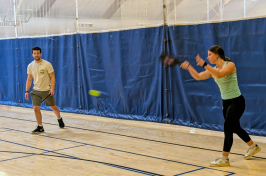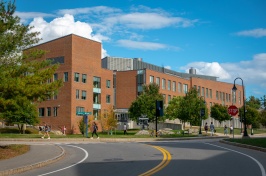UNH Bee BioBlitz Comes to Mount Monadnock Region July 8-11
DURHAM, N.H. - New Hampshire bee enthusiasts will take to the Mount Monadnock region in mass for the 2016 New England Bee BioBlitz organized by the University of New Hampshire. The event takes place July 8-11, 2016, and is open to the public.
The Bee BioBlitz is organized by Sandra Rehan, assistant professor of biological sciences and researcher with the NH Agricultural Experiment Station. Rehan is conducting the research project "Sustainable Solutions to Problems Affecting Bee Health" that is assessing for the first time the Granite State's bee species.
"Last year's event in the White Mountain National Forest was well attended, with more than 30 participants from five states, and we discovered 72 additional species to add to our state bee list," Rehan said.
The goals of the Bee BioBlitz are to document the diversity of bee species in the state, with a particular focus on native bees; connect bee researchers across New England; and demonstrate bee surveys and research techniques to interested members of the public and students.
Bees are important pollinators of food crops and natural ecosystems. The value of pollination to agriculture is estimated at more than $200 billion a year worldwide. The abundance of and diversity of pollinators are declining in many agricultural landscapes across the United States. Given this importance, widespread declines in pollinator diversity have led to concern about a global pollinator crisis. The National Research Council has called for regional, national, and international monitoring programs to allow tracking the status and trends of pollinators.
This year's Bee BioBlitz will focus on southcentral New Hampshire. Areas to be surveyed include Greenfield State Park, which features ponds, bogs forests and Otter Lake; Evas Marsh State Wildlife Management area, consisting of upland and wetland habitat; and Mount Monadnock, one of the most frequently climbed mountains in the world. The home base for the event will be Seven Maples Campground in Hancock.
Permits are required for collecting so attendees should contact Rehan if they are interested in participating. While the event is free, there are fees associated with lodging and meals. For information on fees, visit http://www.unhbeelab.com/bioblitz.html. Those interested in attending or needing additional information should contact Sandra Rehan at sandra.rehan@unh.edu.
This material is based upon work supported by the NH Agricultural Experiment Station, through joint funding of the National Institute of Food and Agriculture, U.S. Department of Agriculture, under award number 1004515, and the state of New Hampshire.
Founded in 1887, the NH Agricultural Experiment Station at the UNH College of Life Sciences and Agriculture is UNH's original research center and an elemental component of New Hampshire's land-grant university heritage and mission.
The University of New Hampshire, founded in 1866, is a world-class public research university with the feel of a New England liberal arts college. A land, sea, and space-grant university, UNH is the state's flagship public institution, enrolling 13,000 undergraduate and 2,500 graduate students.
PHOTOS AVAILABLE FOR DOWNLOAD
https://colsa.unh.edu/nhaes/sites/colsa.unh.edu.nhaes/files/media/images/2015beebioblitz.jpg
More than 30 people from five states participated in the 2015 Bee BioBlitz in the White Mountain National Forest, including this crew. Credit: Sandra Rehan/UNH.
https://colsa.unh.edu/nhaes/sites/colsa.unh.edu.nhaes/files/media/images/masonbee.jpg
Mason bees at a nest entrance. Credit: Molly Jacobson/UNH
https://colsa.unh.edu/nhaes/sites/colsa.unh.edu.nhaes/files/media/images/sweatbee.jpg
Sweat bee on a flower. Credit: Molly Jacobson/UNH
Latest News
-
October 8, 2025
-
October 2, 2025
-
September 24, 2025
-
September 15, 2025
-
August 21, 2025















































